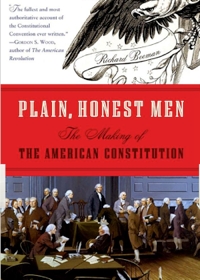Plain, Honest Men

Richard Beeman
Random House
Were it that I had a bucketload of money to send all the members of Congress a copy of "Plain, Honest Men," but I have a nagging feeling the lessons within would not penetrate such thick skulls.
At a time when the right-wing is talking about the Constitution and being loyal to its "plain meaning," the book I just finished shows that the issues we grapple with today are the same as they were over 200 years ago. What is the proper role of a federal government? Should be strong, stronger, strongest? Or should it be just enough to create a sense of nationhood and be given certain responsibilities to insure domestic tranquility while the states retain a strong voice that doesn't kowtow to the folks in Washington? The right-wing makes it seem that the Constitution is the most clear-cut document in history, and we've all just become heretics who have strayed from The Path.
As usual, it's much more complicated than that. As I read the book, the more I was struck how I could be reading a report about the current state of affairs. The Constitution is both very precise and maddeningly vague. We know of the establishment of a bicameral legislature, but what exactly does the phrase "high crimes and misdemeanors" mean? Or the phrase "necessary and proper"? Does it leave the door open for increasing federal power (that's how it's often been interpreted.) And if so, what is the limit of that power and scope and the reach?
In the abstract, the complaints by the Tea Party are nothing new, and they often have a point about the role of the federal government. Should Washington mandate that everyone have health insurance? Does that go beyond the power of the federal government vis-à-vis the authority of the states? When scores of attorneys general filed a suit against the Feds, a cooler mind could find the intellectual point. And in the light of "Plain, Honest Men," their impulses for resisting aren't as cruel and far-fetched as one might assume. Of course, when you do factor in the politics, it's difficult to discern motives that have the public's interests at heart, and that contributes to the polarization. I don't trust their motives at all, but when reading "Plain, Honest Men," you see the Founders acting in their state's own interests, even when it strikes us as either absurd or offensive.
And when it comes to the question of slavery, the author leaves no doubt that the Founders left a great evil unchallenged, and possibly sowed the seeds of the Civil War (see also "American Creation," by Joseph Ellis). It seems a great "what if" of history: what would have happened if the Northern delegates had called the bluff of the Southern delegates regarding slavery? Should there have been a more concerted effort to deny slaveholding states any power at all?
Most importantly, the Founders avoided dealing with the *morality* of slavery, which is why the language of the Constitution doesn't even label the institution. All of them, those who supported it and those opposed to it, to a man, could not contemplate free blacks as equals in their society, much less an entirely emancipated population living in their midst. To our sensibilities, this is unfathomable, but it also forces us to confront the unsettling fact that a paradox was established during those days in Philadelphia that would require the bloodiest war in American history to address it. And even then, the scourge of that paradox still reaches down to the present day.
Even despite the limitations of the era, the Founders still appear light years away from the current crop of Congressional freshmen and their enablers who claim to understand the Constitution from some purist view. The truth of it is, even the Founders were unsure of how to interpret their own document. But more than a few of them would have disdained the pretensions of the Tea Party, and would have viewed them as a force equally capable of tyranny as a strong, central government. This is one of the reasons we have the electoral college, and it goes far in dispelling the myth that the Founders weren't elitists. Of course they were, but like the document they crafted, each succeeding generation wants to interpret them and the Constitution in a convenient manner, preferring to see them not as passionate, learned individuals, but rather as plain, honest men.